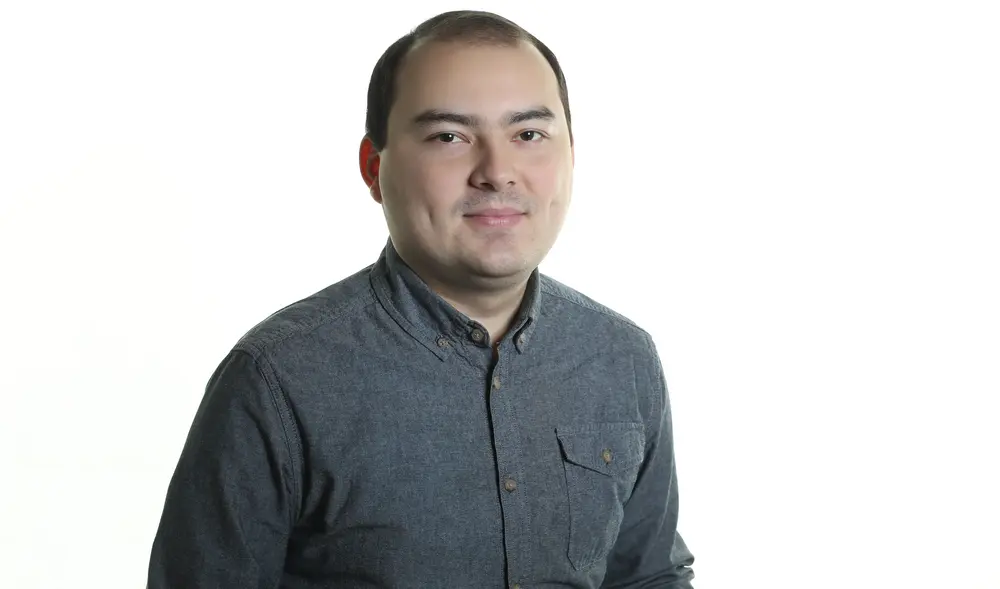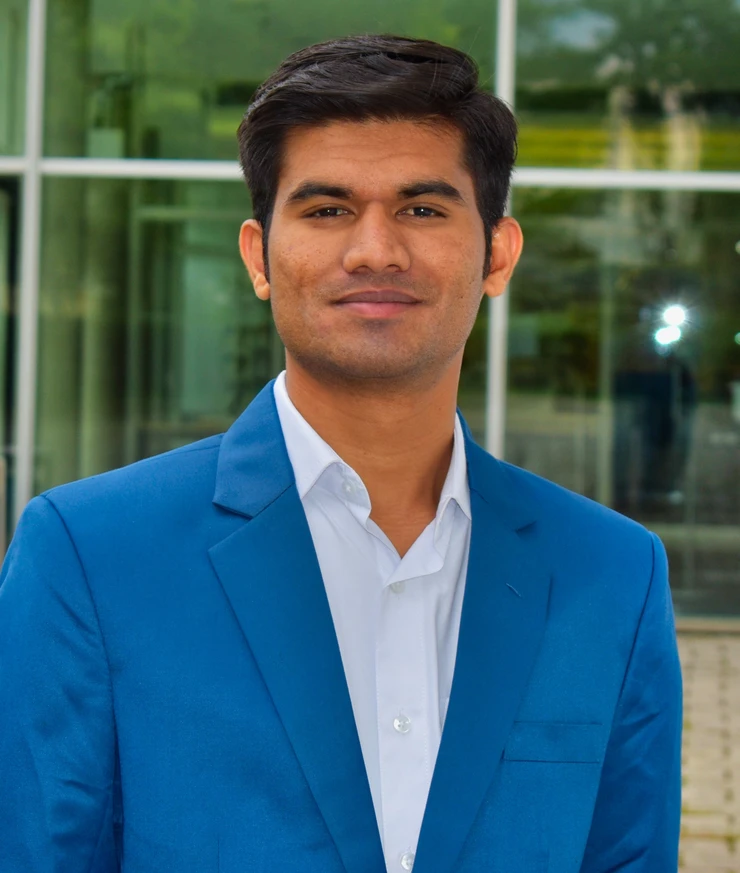The Bulletin interviews: Mukhammadjon Ikromov

Mukhammadjon Ikromov comes from Uzbekistan and graduated from the Brandt School in 2019. He currently works as a Relationship Management Officer with Clearstream in Luxembourg.
In this interview with our second year MPP student Yuvraj Sakhare, conducted on March 26, 2021, Mukhammadjon offers career advice to graduating students and gives useful tips to the new batch.
Thank you for speaking with us! You pursued your first master’s degree in international relations from Scotland. Could you please tell us how you decided to come to Germany for the second master’s in public policy at the Brandt School?
Doing a master’s in International Relations was a natural next step after I had obtained my bachelor’s degree in World Politics. Before pursuing a second master’s in Germany, I was working in the government sector in my home country Uzbekistan. At this point, I felt it was necessary to widen my theoretical and practical knowledge of how different areas of the public and private sectors operate and collaborate with each other. Subsequently, I began searching for a renowned master’s program in public policy/administration where theory and practice are mutually combined, and the MPP at the Willy Brandt School was one of the few relevant programs that fully matched my academic interests. Additionally, German educational institutions offer more flexibility in terms of timing and the choice of selection of courses/internships for students who want to start off their career path right after studies.
Could you tell us how was your academic experience at the Brandt School? What helped you achieve your career objectives?
My academic experience at the Brandt School was memorable and it fully matched my expectations. The program offered a fair number of academic specializations, which included a wide selection of courses, ranging from economics to security studies. Such availability of modules enabled me to gain wider knowledge about public policy areas that helped me identify the right career track. Dr Heike Grimm, the then President of the Brandt School, was my academic mentor, and she always gave useful advice on how to succeed, both academically and professionally. Moreover, the program offered in-depth German language courses, which came as a bonus.
As for the challenges, the initial experience in Erfurt was not easy for students like me who came from a different cultural background with no knowledge of the German language. Furthermore, while I still think a mandatory internship is an essential conduit of any program to progress from academia to public service or private industry, managing both studies and internship is quite demanding, especially when thesis writing clashes with your work as an intern. You need to have time and energy for both, as they are equally important for successful graduation, as well as a career launch.
You did your internship at Clearstream and subsequently started working as a Relationship Management Officer with them. What skills helped you get these opportunities? How much role German language proficiency plays while working and living in Luxembourg?
First and foremost, gaining practical experience in the company, even as an intern, remains one of the key aspects to be hired as a full-time employee afterwards. In order to work as a Relationship Manager, communication and languages skills obviously play an important role in successfully accomplishing your tasks. Furthermore, in-depth knowledge of different financial markets (in my case, Central and Eastern Europe) was a big asset in securing the job after the internship. Possessing certain level of German language plays a greater role in a working environment in Luxembourg. German is one of the three officially recognized languages in the country and most residents are multilingual. Being a fluent speaker in four or five languages is not uncommon in the country.
Could you tell us what Clearstream does and the role you play in the company?
Clearstream is a unique financial institution. It is one of the largest clearing houses in Europe and one of the two International Central Securities Depositories in the world. At a post-trading level, the company offers a wide range of financial services, such as settlement and safekeeping of securities, asset servicing, investment fund services, etc. Having around 2,500 customers in more than 100 countries, the organization has links to over 50 markets. I am responsible for the account management for the customers operating in Central and Eastern Europe. My daily tasks and operations are concerned with dealing customer relationship management matters.
How has Covid-19 impacted the securities industry and financial markets in your opinion? What has changed at your workplace?
The Covid-19 pandemic has undoubtedly brought a severe impact on financial markets, and on the commodity market in particular. Essentially, in the early days of the pandemic, future uncertainty amid the global lockdown made the assessment of the financial and credit risks more complicated. In stock markets, several global indices hit the lowest since the 2008 global financial crisis, causing high market volatility. The majority of the human workforce in the financial sector had to switch to a “work from home” policy, of which Clearstream was no exception. Precautionary measures against Covid-19 are taken seriously at my workplace, and I am still working remotely.
What advice would you give to our graduating students, who would be starting their professional lives very soon? What skills students should develop?
Based on my own job-hunting experience in Germany, I would urge the Brandt School’s graduating candidates to pay close attention to internship opportunities. Finding the right internship in the right place is essential to finding your career track in the foreseeable future. Considering current turbulences in job markets worldwide, keep applying for internship positions, preferably the long-term ones, until you are accepted. Other supplementary skills that might support building your professional career are networking and language skills. During and after the study period, please use your social communication skills, both online and offline, to reach out to people you deem as vital for your career. Likewise, keep taking language classes even after graduation. My personal observations indicate that the European labor market, or at least Luxembourg, requires and are in favor of multilingual candidates.
What are the possible career paths that can be explored after the MPP?
I would say there are dozens of post-study opportunities after completing the MPP program. As I mentioned above, public policy is a wide area, and embraces many academic fields - security studies, political science, international relations, public management, sustainable development, economics, finance, etc. Thereby, MPP graduates can decide on one of the numerous career paths they face, well before graduation. Depending on the academic tracks chosen, one can pursue their career either in the private, public, or academic sector. The size of a hiring entity and the scope of their operations can vary – it could be a new start-up looking for a Public Relations manager, or a global international organization, like in my case. The exploration of the workplaces you are willing to work in first emerges out of your passion for what you truly like being engaged in, and, most importantly, whether you have a clear vision of where exactly you see yourself in coming years. It is no wonder why this above question is normally asked in many job interviews.
What tips would you share with the students who have just started their academic journey at the Brandt School?
Let me incorporate my small tips into bullet points:
- Take German and/or other languages classes as early as possible and continue without having long breaks. You have a limited period until you become fluent in four or five useful languages when you graduate.
- The MPP program is very diverse in its academic track offerings. Choose the ones you perceive as important and interesting for your future and carry on your studies within this study framework.
- Develop and deploy your networking skills. You may possess the best knowledge and experience in your field, but the right and reliable networking might land you an internship/job you are looking for much faster.

About the interviewer
Yuvraj Sakhare is a second-year MPP candidate at the Willy Brandt School of Public Policy, specializing in International Political Economy and European Public Policy. He holds a Postgraduate Diploma in Journalism and has worked as a Business & Economy editor in India. Yuvraj's academic and research interests lie in state-market relations, trade policy, economic governance, foreign policy analysis, and Chinese affairs. He is currently the editor of The Bulletin.
~ The views represented in this blog post do not necessarily represent those of the Brandt School. ~